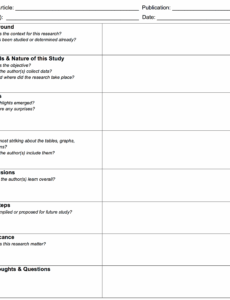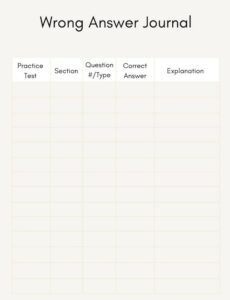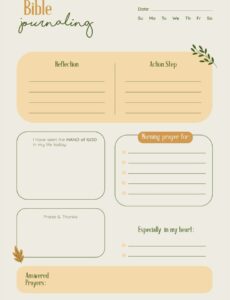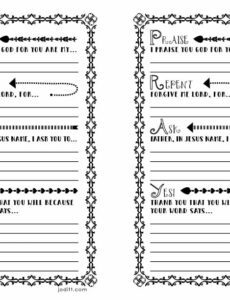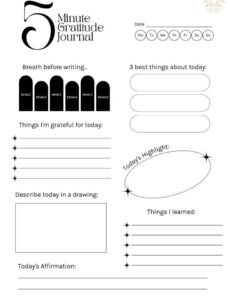As social workers, we navigate a complex landscape of human emotions, challenging situations, and critical decisions every single day. The demands of the profession are immense, requiring not just empathy and skill, but also a robust capacity for self-awareness and continuous learning. It’s easy to get caught up in the immediate needs of clients and the administrative tasks, often leaving little room to pause and process our own experiences.
This is where the power of reflective practice comes into play, offering a vital space for professional growth and personal resilience. Engaging in regular reflection allows us to make sense of our interactions, understand our emotional responses, and refine our approach to practice. And while the act of reflection can feel intuitive, having a structured approach, perhaps through a social work reflective journal template, can significantly enhance its effectiveness and ensure we’re getting the most out of our invaluable experiences.
Why Reflective Journaling is Crucial for Social Workers
Reflective journaling is not just a nice-to-have; it’s a fundamental tool for any social worker committed to ethical practice and sustainable well-being. Think about the intensity of your daily work – the difficult conversations, the ethical dilemmas, the moments of profound sadness or immense joy. Without a dedicated space to process these experiences, they can accumulate, leading to burnout, compassion fatigue, and a reduced capacity to serve clients effectively. A reflective journal provides that much-needed outlet, acting as a confidential sounding board for your thoughts and feelings.
Through consistent journaling, you’re actively engaging in a process of self-supervision. You begin to identify patterns in your practice, recognize your strengths, and pinpoint areas where you might need further development or support. It’s a powerful way to turn lived experience into learned wisdom, moving beyond simply reacting to situations to proactively shaping your professional identity and enhancing your skills. This ongoing self-assessment is key to maintaining professional standards and fostering a growth mindset.
Moreover, journaling supports ethical decision-making. Social work often places us in situations where there are no easy answers, and multiple ethical principles might be in tension. By writing down the specifics of a dilemma, exploring your immediate reactions, and then critically analyzing the various courses of action, you can arrive at more considered and ethically sound conclusions. This structured approach helps to clarify thinking and move beyond knee-jerk responses.
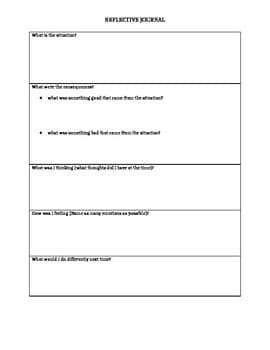
It’s also a powerful tool for emotional processing. The emotional labor involved in social work is significant, and suppressing feelings can be detrimental to both your personal health and professional efficacy. A journal offers a safe, private space to acknowledge and explore your feelings without judgment. This emotional release and understanding can prevent emotional overload, making you a more resilient and present practitioner.
Benefits of Regular Reflection
- Enhances self-awareness and understanding of personal biases.
- Improves critical thinking and problem-solving skills.
- Supports ethical decision-making in complex situations.
- Reduces stress and prevents burnout by facilitating emotional processing.
- Fosters continuous professional development and identification of learning needs.
- Strengthens professional identity and confidence.
Components of an Effective Social Work Reflective Journal Template
While the act of reflection is personal, a well-designed social work reflective journal template can provide a valuable framework, ensuring you cover all essential aspects of an experience and gain the maximum insight. It helps you move beyond simply recounting events to deeply analyzing them, transforming raw experience into actionable learning. There isn’t a single “perfect” template, but effective ones typically guide you through a series of prompts that encourage structured thought.
At its core, a good template will prompt you to describe the situation objectively before delving into your subjective experience. This clear distinction between facts and feelings is crucial for a balanced reflection. You’ll be encouraged to think about not just what happened, but also your role, the roles of others, and the broader context that might have influenced the event. This multi-faceted examination leads to a richer understanding.
Following the description and your initial emotional response, the template will then guide you towards critical analysis. This is where you might connect the experience to social work theories, ethical guidelines, or your professional values. What assumptions were you making? What alternative actions could have been taken? What were the power dynamics at play? This analytical step is where genuine learning and professional growth truly begin, as you deconstruct the situation with a more objective lens.
Finally, an effective social work reflective journal template will push you to consider the “so what?” and “what next?” questions. What did you learn from this experience? How will it inform your future practice? Are there specific skills you need to develop, or resources you need to seek out? This forward-looking aspect ensures that your reflections are not just retrospective, but also proactive, leading to tangible changes in your approach and ongoing professional development.
Key Sections to Include
- Date and Context: When and where did the event occur? Who was involved?
- Description of the Situation: What exactly happened? Be factual and concise.
- Your Feelings and Reactions: What were you thinking and feeling during and after the event? Be honest and non-judgmental.
- Analysis and Interpretation: Why did things unfold as they did? What theories, values, or ethical principles are relevant? What were your assumptions?
- Action Plan and Future Steps: What would you do differently next time? What actions will you take based on this reflection?
- Learning and Insights: What did you learn about yourself, your practice, or the client/situation?
Embracing reflective journaling is a powerful commitment to your own professional growth and well-being as a social worker. By regularly taking the time to process your experiences, you are not only enhancing your skills and ethical practice but also building resilience against the inherent stresses of the profession. This consistent engagement with self-reflection transforms challenges into opportunities for deeper understanding and more effective interventions.
Ultimately, a structured approach to reflection, whether through a simple notebook or a comprehensive template, empowers you to be a more thoughtful, ethical, and self-aware practitioner. It’s an investment in yourself that pays dividends for your clients, your team, and your entire career journey, allowing you to continually evolve and thrive in a demanding yet incredibly rewarding field.
